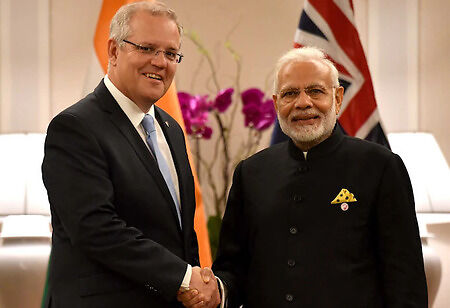
Early CECA Conclusion, 29 Artefacts Returned! India-Australia 2022 Summit


When the first virtual summit took place, India was ranked as Australia’s seventh largest trading partner and sixth largest export market in 2020 and the credits goes to coal and international education. This is due to the fact that education is Australia's greatest service export to India, with a value of $ 6 billion and an estimated 88 percent share in 2020. The relationship is based on people-to-people connections, with the Indian diaspora's population and contributions to Australia's economy and multicultural landscape both rising. Australia and India are resuming negotiations on a bilateral Comprehensive Economic Cooperation Agreement (CECA) and advancing cooperation in key minerals, health, critical technology, science, and agriculture, among other sectors.
This summit takes place two years after its first virtual summit in June 2020 when both nations progressed their relationship to a comprehensive strategic partnership. This year, both nations are said to take a look at the kind of progress made across various initiatives under the Comprehensive Strategic Partnership.
What’s on the Agenda?
The two leaders will commit to a closer cooperation across critical minerals, in trade, migration and mobility among others.
Both PMs will exchange views around international and regional issues of mutual interest.
Largest ever trade pact by the Government of Australia in India with Canberra weighing Rs. 1,500 crores will be announced in India across multiple sectors.
An early harvest agreement is expected to witness its conclusion by the end of this month.
Both nations will be signing a MoU around critical minerals to help increase India’s access to metallic coal and lithium in Australia, while serving the country’s growing demand for electric vehicles and growing infrastructure.
Early Conclusion on CECA with Australia
“Our collaboration (India-Australia) has grown rapidly in areas such as critical minerals, water management, renewable energy and COCID-29 research”, claimed PM Modi during the opening of his remarks at the summit. He also expressed gratitude towards his Australian counterpart for taking the initiative of returning 29 Indian antiquities.
In PM Modi’s words, “I would like to especially thank you for taking the initiative to return ancient Indian artefacts. Among them are hundreds of years old idols and pictures illegally removed from Rajasthan, West Benal, Gujarat, Himachal Pradesh along with many other Indian states.
In the last few years, the PM said that both India and Australia have made remarkable progress in their ties regarding trade and investment, defense and security, education and innovation, science and technology, highlighting a close cooperation in these areas.
It appears that the India-Australia Comprehensive Strategic Partnership has maintained a momentum of an upward trajectory as countries pursued their collaborations despite COVID-19 restrictions.
Early closure of CECA is believed to be vital for economic ties, economic revival and economic security of both countries, while a good collaboration seems to be maintained in Quad, remarked the PM.
This commitment reflects a free, open and inclusive Indo-Pacific, noted the PM.
Conclusion of Early Harvest Agreement
India has expressed interest in expanding bilateral collaboration in the rare earth minerals sector with Australia. A total of Rs 152 crore would be set aside for the establishment of new centres to strengthen bilateral ties, with another Rs 97 crore set aside for skill development programmes.
This investment package is believed to boost ties with India, added with Rs.183 crore for cooperation in clean technology along with critical minerals, besides Rs.136 crore for enhancing ties in the space sector.
"Prime Minister Modi and I will discuss deepening our trade and investment relationship and harnessing new economic opportunities to support our mutual economic recovery and growth," Morrison said.
The Rs 1,500 crore investment package will be the largest ever Australian government investment in the bilateral partnership between India and Australia.
The summit will emphasize that Australia and India are top-tier partners, and more ambition and tangible progress will be delivered for the partnership.
In the post-pandemic world, Modi and Morrison will focus on establishing a strong bilateral framework. The virtual summit will pave the way for new initiatives and increased cooperation between India and Australia across a wide variety of sectors.
A rising India will require many of Australia's commodities and services during the next 20 years, including agriculture, education and skills training, and healthcare.
Prior to COVID-19, India's economy ranked third in the world in terms of purchasing power parity (PPP) and was expected to rank third in market exchange rate terms by 2030. The severe disruptions triggered by COVID-19, along with the implementation of economic assistance measures and structural reforms, have resulted in significant changes in India's business environment.
India's strong fundamentals such as its young demography, expanding consumer class, steady urbanization, unmet infrastructure investment demand, and digitization and formalization of the economy are projected to drive sustained development in the long run.
The government is pursuing an ambitious economic reform plan that includes bringing more businesses into the formal economy, selling the government's interest in the public sector, improving GST compliance, and lowering bad debts in the financial sector. Steps to liberalize internal agriculture markets and relax labour laws, as well as education policy reforms, are among the further measures. These initiatives expand on a slew of economic reforms along with the implementation of a GST, direct benefit transfers, and a new insolvency and bankruptcy framework.
Through people-to-people interactions, Australia and India are forging deep and lasting bonds. India continues to be Australia's most important supplier of skilled migrants and overseas students. Australia's foreign and commercial policy objectives with India are also promoted via the Australia-India Council (AIC). The AIC Board of Directors makes recommendations to DFAT for projects that will foster new long-term cooperation and reduce perceived barriers to engagement between our two countries.